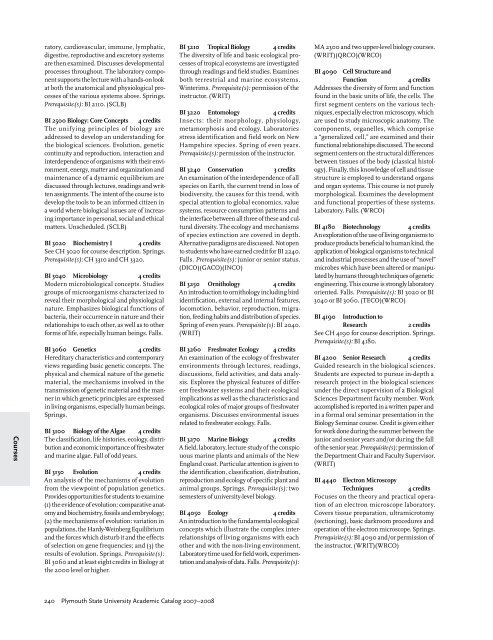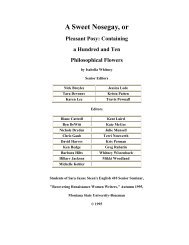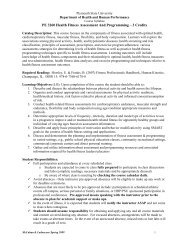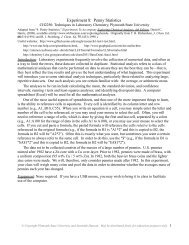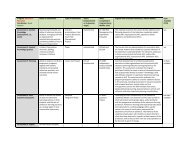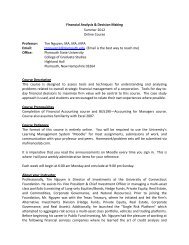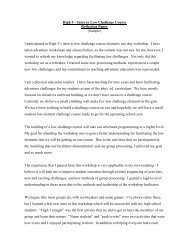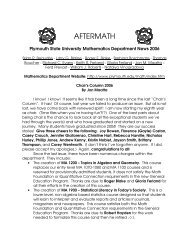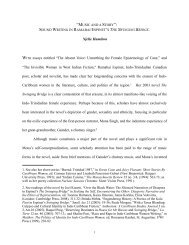2007-2008 Undergraduate Academic Catalog - Plymouth State ...
2007-2008 Undergraduate Academic Catalog - Plymouth State ...
2007-2008 Undergraduate Academic Catalog - Plymouth State ...
- No tags were found...
You also want an ePaper? Increase the reach of your titles
YUMPU automatically turns print PDFs into web optimized ePapers that Google loves.
Coursesratory, cardiovascular, immune, lymphatic,digestive, reproductive and excretory systemsare then examined. Discusses developmentalprocesses throughout. The laboratory componentsupports the lecture with a hands-on lookat both the anatomical and physiological processesof the various systems above. Springs.Prerequisite(s): BI 2110. (SCLB)BI 2500 Biology: Core Concepts 4 creditsThe unifying principles of biology areaddressed to develop an understanding forthe biological sciences. Evolution, geneticcontinuity and reproduction, interaction andinterdependence of organisms with their environment,energy, matter and organization andmaintenance of a dynamic equilibrium arediscussed through lectures, readings and writtenassignments. The intent of the course is todevelop the tools to be an informed citizen ina world where biological issues are of increasingimportance in personal, social and ethicalmatters. Unscheduled. (SCLB)BI 3020 Biochemistry I 4 creditsSee CH 3020 for course description. Springs.Prerequisite(s): CH 3310 and CH 3320.BI 3040 Microbiology 4 creditsModern microbiological concepts. Studiesgroups of microorganisms characterized toreveal their morphological and physiologicalnature. Emphasizes biological functions ofbacteria, their occurrence in nature and theirrelationships to each other, as well as to otherforms of life, especially human beings. Falls.BI 3060 Genetics4 creditsHereditary characteristics and contemporaryviews regarding basic genetic concepts. Thephysical and chemical nature of the geneticmaterial, the mechanisms involved in thetransmission of genetic material and the mannerin which genetic principles are expressedin living organisms, especially human beings.Springs.BI 3100 Biology of the Algae 4 creditsThe classification, life histories, ecology, distributionand economic importance of freshwaterand marine algae. Fall of odd years.BI 3130 Evolution 4 creditsAn analysis of the mechanisms of evolutionfrom the viewpoint of population genetics.Provides opportunities for students to examine(1) the evidence of evolution: comparative anatomyand biochemistry, fossils and embryology;(2) the mechanisms of evolution: variation inpopulations, the Hardy-Weinberg Equilibriumand the forces which disturb it and the effectsof selection on gene frequencies; and (3) theresults of evolution. Springs. Prerequisite(s):BI 3060 and at least eight credits in Biology atthe 2000 level or higher.BI 3210 Tropical Biology 4 creditsThe diversity of life and basic ecological processesof tropical ecosystems are investigatedthrough readings and field studies. Examinesboth terrestrial and marine ecosystems.Winterims. Prerequisite(s): permission of theinstructor. (WRIT)BI 3220 Entomology 4 creditsInsects: their morphology, physiology,metamorphosis and ecology. Laboratoriesstress identification and field work on NewHampshire species. Spring of even years.Prerequisite(s): permission of the instructor.BI 3240 Conservation 3 creditsAn examination of the interdependence of allspecies on Earth, the current trend in loss ofbiodiversity, the causes for this trend, withspecial attention to global economics, valuesystems, resource consumption patterns andthe interface between all three of these and culturaldiversity. The ecology and mechanismsof species extinction are covered in depth.Alternative paradigms are discussed. Not opento students who have earned credit for BI 2240.Falls. Prerequisite(s): junior or senior status.(DICO)(GACO)(INCO)BI 3250 Ornithology 4 creditsAn introduction to ornithology including birdidentification, external and internal features,locomotion, behavior, reproduction, migration,feeding habits and distribution of species.Spring of even years. Prerequisite(s): BI 2040.(WRIT)BI 3260 Freshwater Ecology 4 creditsAn examination of the ecology of freshwaterenvironments through lectures, readings,discussions, field activities, and data analysis.Explores the physical features of differentfreshwater systems and their ecologicalimplications as well as the characteristics andecological roles of major groups of freshwaterorganisms. Discusses environmental issuesrelated to freshwater ecology. Falls.BI 3270 Marine Biology 4 creditsA field, laboratory, lecture study of the conspicuousmarine plants and animals of the NewEngland coast. Particular attention is given tothe identification, classification, distribution,reproduction and ecology of specific plant andanimal groups. Springs. Prerequisite(s): twosemesters of university-level biology.BI 4050 Ecology 4 creditsAn introduction to the fundamental ecologicalconcepts which illustrate the complex interrelationshipsof living organisms with eachother and with the non-living environment.Laboratory time used for field work, experimentationand analysis of data. Falls. Prerequisite(s):MA 2300 and two upper-level biology courses.(WRIT)(QRCO)(WRCO)BI 4090 Cell Structure andFunction4 creditsAddresses the diversity of form and functionfound in the basic units of life, the cells. Thefirst segment centers on the various techniques,especially electron microscopy, whichare used to study microscopic anatomy. Thecomponents, organelles, which comprisea “generalized cell,” are examined and theirfunctional relationships discussed. The secondsegment centers on the structural differencesbetween tissues of the body (classical histology).Finally, this knowledge of cell and tissuestructure is employed to understand organsand organ systems. This course is not purelymorphological. Examines the developmentand functional properties of these systems.Laboratory. Falls. (WRCO)BI 4180 Biotechnology 4 creditsAn exploration of the use of living organisms toproduce products beneficial to human kind, theapplication of biological organisms to technicaland industrial processes and the use of “novel”microbes which have been altered or manipulatedby humans through techniques of geneticengineering. This course is strongly laboratoryoriented. Falls. Prerequisite(s): BI 3020 or BI3040 or BI 3060. (TECO)(WRCO)BI 4190 Introduction toResearch2 creditsSee CH 4190 for course description. Springs.Prerequisite(s): BI 4180.BI 4200 Senior Research 4 creditsGuided research in the biological sciences.Students are expected to pursue in-depth aresearch project in the biological sciencesunder the direct supervision of a BiologicalSciences Department faculty member. Workaccomplished is reported in a written paper andin a formal oral seminar presentation in theBiology Seminar course. Credit is given eitherfor work done during the summer between thejunior and senior years and/or during the fallof the senior year. Prerequisite(s): permission ofthe Department Chair and Faculty Supervisor.(WRIT)BI 4440 Electron MicroscopyTechniques4 creditsFocuses on the theory and practical operationof an electron microscope laboratory.Covers tissue preparation, ultramicrotomy(sectioning), basic darkroom procedures andoperation of the electron microscope. Springs.Prerequisite(s): BI 4090 and/or permission ofthe instructor. (WRIT)(WRCO)240 <strong>Plymouth</strong> <strong>State</strong> University <strong>Academic</strong> <strong>Catalog</strong> <strong>2007</strong>–<strong>2008</strong>


